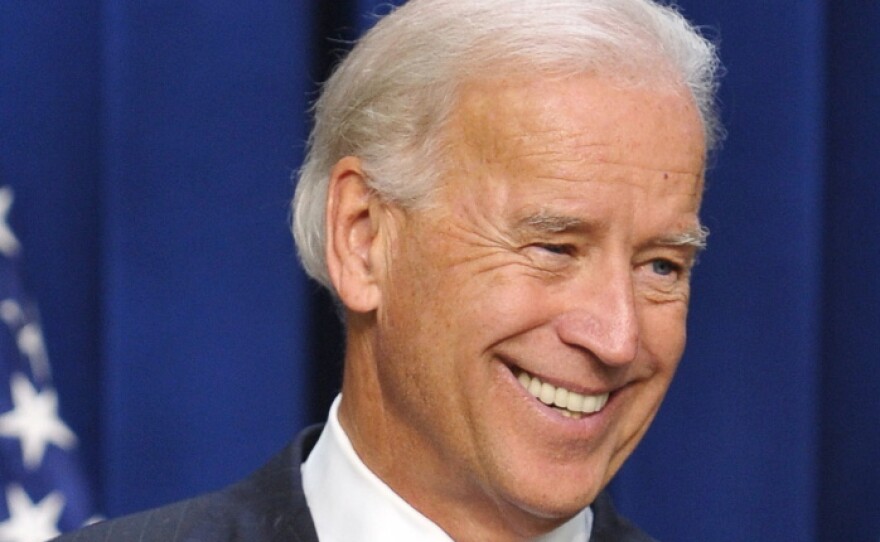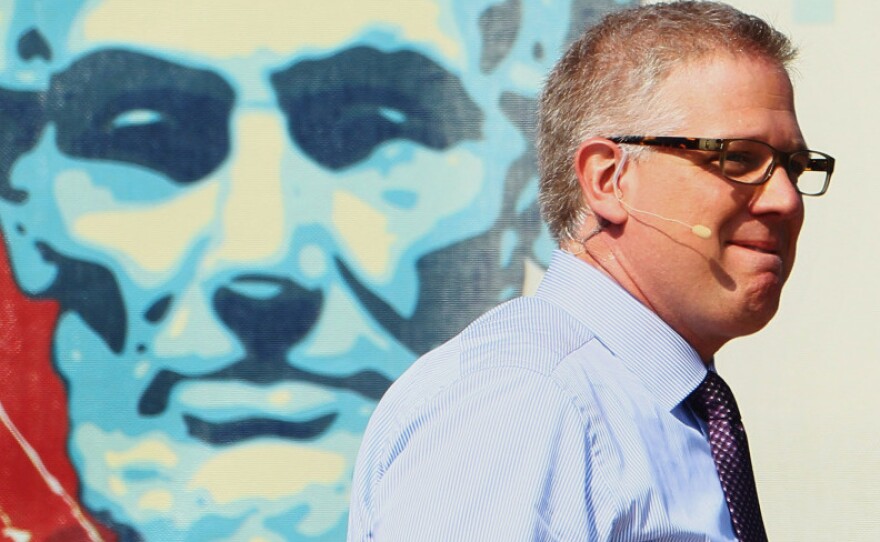Daily Beast Editor-in-Chief Tina Brown is back for another visit with NPR, joining Steve Inskeep for the feature Morning Edition calls Word of Mouth. She tells us about some of the most memorable things she's been reading lately, in hopes of helping us cut through the clutter and read a few good things ourselves.
This month, Brown says she has found herself drawn to articles about the portrayal of icons, ranging from political figures Glenn Beck and Joe Biden to the founder of Facebook, Mark Zuckerberg.
'Being Glenn Beck'
Brown's first choice is from The New York Times Magazine, a profile of a TV talker called "Being Glenn Beck." The profile, by Mark Leibovich, is "droll, probing, and really at times hilariously funny. You know, he talks about the strange confusion that coexists inside the person of Glenn Beck."
Confusion? Well, in his recent "Restoring Honor" rally on the National Mall in Washington, D.C., Beck spoke about getting back to core American values -- about uniting the nation and "how we have to come together with our values," Brown says.
But as Leibovich notes, there's a very different side of Beck.
"He's also talking about poisoning Nancy Pelosi, or choking to death Michael Moore, or beating to death with a shovel Charlie Rangel," Brown says. "I mean, the rhetorics just don't match."
Leibovich considers the possibility that Beck may be a mere charlatan. But he also raises the idea in his article, Brown says, that perhaps "these two personas inside Glenn Beck kind of coexist, and he's not even sure who he is at this point." He shifts "between this 12-step program therapy-speak" and the more strident cadences of what Leibovich describes as "this self-teaching populist for the Internet age."

Beck loyalists have been known to make a surprising comparison, noting similarities between Beck and Oprah. Brown points out, however, that "Oprah doesn't speak like that about people, like [Beck] does about Pelosi and Michael Moore."
The part of the profile that really interests Brown, she says, is that Leibovich portrays other Fox personalities and the network itself as "pretty uneasy about Glenn Beck."
"Because he's becoming something almost extra-network," she says. Other big Fox names have their wagons hitched more or less firmly to the network's star, Brown says. Not Beck -- at least not anymore.
"He's becoming his own kind of crusade, which is making the other anchors -- people like Bill O'Reilly and Sean Hannity -- very uneasy."
'The Salesman'
Brown's next recommendation concerns a very different political figure -- Vice President Joe Biden. "The Salesman," by Mark Bowden in The Atlantic magazine, is "a big, deep, almost luxurious look at the guy, and he really talks about Biden as a salesman -- a high-level one, but a salesman at heart," Brown says.
Bowden argues that Biden has "the same moves" as his car-salesman father:
"He is a virtuoso talker. That fluency is not a gift but an accomplishment: attaining it meant defeating a severe boyhood stutter, a feat in which he still takes pride. His prodigious loquacity is not about vanity, as his critics claim—although Biden is as vain as the next successful man. It's about selling. It's about the deal. In fact, that's one of his favorite expressions: Here's the deal."
Bowden, says Brown, is "a wonderful writer," and she especially praises his description of what happens when the vice president turns the full force of his charm on a target. The magazine calls it "Getting Bidened":
"Joe Biden doesn't just meet you, he engulfs you. There's the direct contact with his blue eyes, the firm handshake while his other hand grasps your arm, the flash of those famously perfect white teeth, and an immediate frontal assault on your personal space. He shoulders right through the aura of fame and high office. Forget the Secret Service, the ever-present battery of aides and advisers, the photographers clicking away: the vice president of the United States moves in like an old pal with something urgent to tell you -- just you."
'What's True in the Facebook Movie?'
The third of Brown's reading suggestions comes from her own website and takes a different angle on a cultural icon. David Kirkpatrick, author of a book called The Facebook Effect, filed an article in the Daily Beast called "What's True in the Facebook Movie?"
"He talks about how tremendously distorted the image of Zuckerberg is in the screen version," Brown says. It raises interesting questions, she says, about "the amazing liberties you can take with a movie, where you can portray somebody very differently to how people actually see him and know him to be -- and it's OK."
Among the differences outlined in Kirkpatrick's take, Brown says, is that actor Jesse Eisenberg
"plays Zuckerberg as an angry, insecure but cocky young jerk whose creation of the service initially called Thefacebook was motivated in large part by a desire to win the attention of a former girlfriend. In fact, Zuckerberg is one of the least angry people I've ever met. He is even-tempered, generally upbeat, if prone to silence, and highly self-confident."
Kirkpatrick, Brown explains, says Zuckerberg dated the same girl throughout most of the movie's events, and still lives with her today. But in the movie, Brown says, Facebook is shown as "social revenge because he can't get into the Harvard clubs, and can't get the girl that he loves to like him back."
What about the popular notion that he stole other people's ideas? Kirkpatrick, Brown says, "does actually absolve him of the charge of the movie, which is that basically Zuckerberg is portrayed as a guy who, nothing will stop him as he rips off ideas and brings them to birth."
That's not to say he didn't do a little bit of competitive misleading, especially with regard to "these hysterical characters who actually are real -- the Winklevoss twins, these very rich Harvard kids who were also Olympic rowers," Brown says. In the film, "the Winklevii," as Zuckerberg scornfully calls them, say he stole their idea for what became Facebook.
Kirkpatrick says their idea and the Zuckerberg project that evolved into the social-media powerhouse wasn't quite the same -- but "certainly Zuckerberg let them not know until the bitter end that he was doing his own thing," Brown explains, "just to kind of slow down their competitiveness."
Copyright 2022 NPR. To see more, visit https://www.npr.org. ![]()






